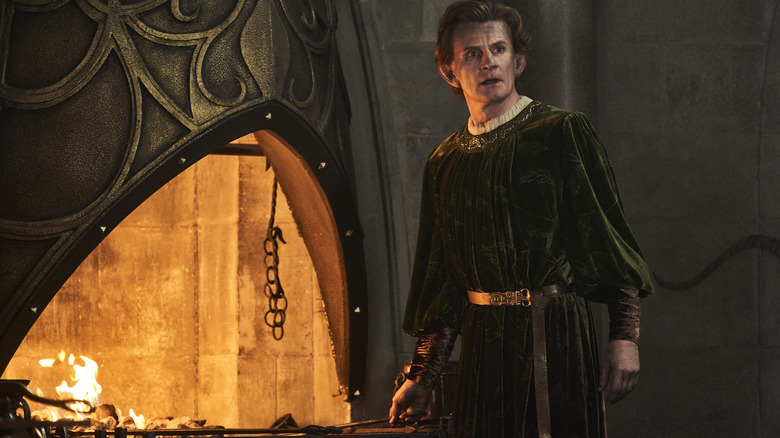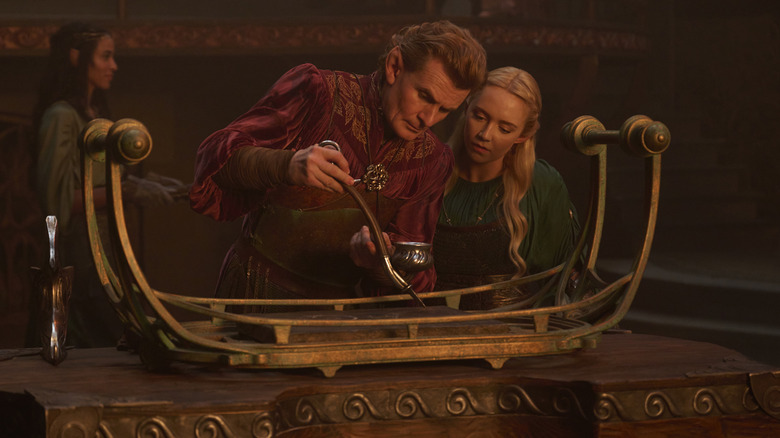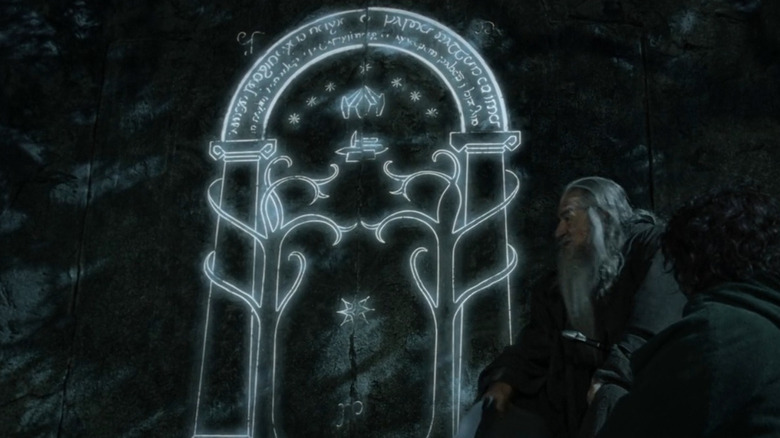You've Seen The Ithildin From Rings Of Power In The Lord Of The Rings Movies
Speak, friend, and enter ... but only after watching the first three episodes of "The Lord of the Rings: The Rings of Power" season 2. Major spoilers abound.
"The Rings of Power" is officially back and better than ever (for more on that, check out my review of season 2 here), and with it comes all the usual deep-cut references to complicated lore that author J.R.R. Tolkien first dreamed up all those decades ago. Much of that ended up on the big screen in Peter Jackson's "The Lord of the Rings" and "The Hobbit" trilogies, taking some seriously out-there topics and turning them into pop culture staples. In no time at all, everyone knew about the seductive temptations inherent in the various rings of power, the stark differences between Hobbits and elves and dwarves, and all the nerdiest details that, once upon a time, only ever existed in fan-run wiki sites and niche internet forums. A new dawn and a new era is truly upon us, however, and the Prime Video series is wasting no time at all in throwing viewers into the deep end of the swimming pool.
While the premiere tosses all sorts of high-fantasy concepts at us, the second episode introduces one particular item known as "ithildin." To set the stage, we follow the skilled artisan Celebrimbor (Charles Edwards) in the aftermath of his forging of the three elven rings of power. Not content to simply stop there, he remains in Eregion and uses the forge he commissioned to further define his legacy. Luckily, he has enough time and effort for one more work of wonder: an invisible substance that glows in moonlight that he proudly calls ithildin. And observant fans will likely realize that they have, in fact, seen this before.
Ithildin appears in a key moment of The Fellowship of the Ring
Although "The Rings of Power" is obligated to remain part of a separate continuity from the Peter Jackson movies (because "The Lord of the Rings" is mired in a somewhat confusing copyright situation), the series has found several ways to provide origin stories for many of the broader ideas popularized by the previous trilogies. For example, season 1 provided an unexpected explanation for mithril, the dwarven ore that goes on to shape the destiny of the underground city of Khazad-dûm (later known as the Mines of Moria). And, of course, the entire series follows familiar characters of legend such as Galadriel (Morfydd Clark), Elrond (Robert Aramayo), and Sauron (Charlie Vickers), all of whom go on to appear thousands of years later during the events of "The Hobbit" and "The Lord of the Rings." The next item up on the list, surprisingly, is ithildin.
Casual "The Rings of Power" viewers might not have clocked the importance of ithildin during this seemingly throwaway moment, but rest assured that this will come back later. While hard at work in Eregion, Celebrimbor recruits an assistant named Mirdania (Amelia Kenworthy) to help him unveil his latest creation. Although at first unable to be perceived by the naked eye, the magically enchanted ithildin is refined from the purest mithril ore and requires moonlight and starlight to reveal its hidden secrets etched onto a slab of stone. It's not immediately made clear what the purpose of this will be for, but fans who've seen "The Fellowship of the Ring" know full well. Eventually, this will be used on the fabled "Doors of Durin" that mark one particular entryway into the Mines of Moria — and one day, our plucky heroes will desperately need to gain entrance to the same vast halls that Elrond and Prince Durin (Owain Arthur) once walked.
How J.R.R. Tolkien described ithildin
For as much as purists may complain about the artistic license taken by showrunners J.D. Payne and Patrick McKay, it's clear that "The Rings of Power" creative team have done their homework and research into Tolkien's original writing. Although we only catch a brief glimpse of Celebrimbor's ithildin, it's plainly taken right out of the author's own drawings of the Doors of Durin (found halfway through the first book, in the chapter titled, "A Journey in the Dark"). The intricately designed artwork is just a sliver of what will wind up on the doors, depicting an arched gateway with "the emblems of Durin" (as stated by the dwarf Gimli) and intertwined with what the elf Legolas excitedly describes as "the Tree of the High Elves." According to Gandalf:
"They are wrought of ithildin that mirrors only starlight and moonlight, and sleeps until it is touched by one who speaks words now long forgotten in Middle-earth."
The scene is adapted fairly faithfully in Peter Jackson's "The Fellowship of the Ring," though the novel goes into even greater detail. The wizard goes on to say that the elvish writing indicates, "They say only: 'The Doors of Durin, Lord of Moria. Speak, friend, and enter.' And underneath small and faint is written: 'I, Narvi, made them. Celebrimbor of Hollin drew these signs.'"
Wouldn't you know it, that's the same Celebrimbor we've gotten to know in "The Rings of Power," while the dwarven craftsman Narvi also appears in the second season, played by Kevin Eldon. Viewers will have to keep watching to find out whether future episodes actually show these great doors built and carved into the mountain that's home to Khazad-dûm.
New episodes of "The Rings of Power" stream on Prime Video every Thursday.


